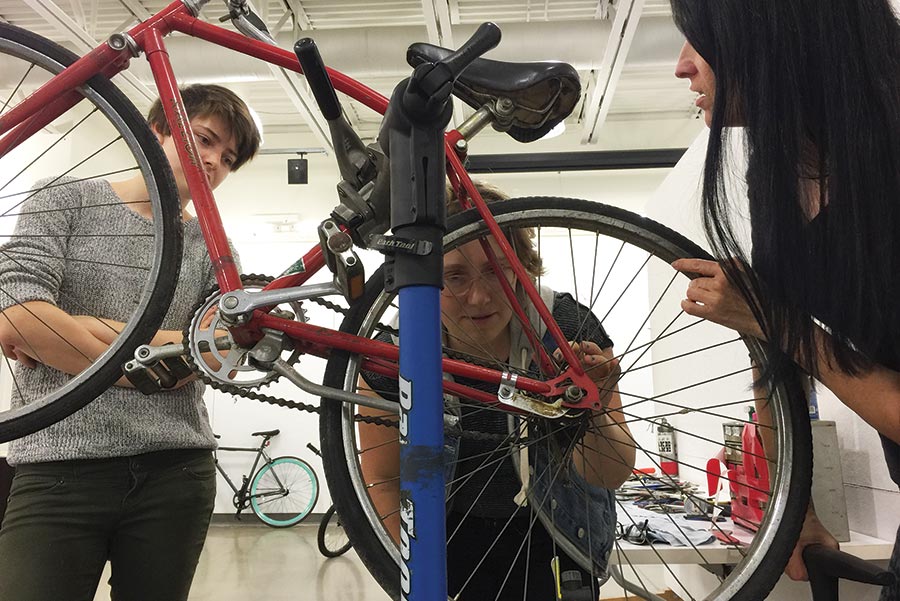When Stephanie Rogers lived in Minneapolis, she spent nearly three years involved with a women and trans group of cyclists.
“I encountered women- and trans-only spaces before mainstream bike culture,” said Rogers, adding she took up biking because she was broke and needed a way to get around.
She said, every month, there were about 10 open workshops focused on bike maintenance for women and trans folks across Minneapolis, a city of about 400,000 people. There were even spaces for women and trans people of color.
About a year-and-a-half ago, Rogers moved to Philadelphia to start a graduate program in photography at the Tyler School of Art at Temple University. Despite living in a much larger city, she noticed fewer resources.
Rogers started working on her bike at Neighborhood Bike Works in West Philadelphia. The Divine Bike Church, which uses Neighborhood Bike Works space, hosts women- and trans-maintenance sessions every Wednesday night. Rogers wanted to bring that community-building resource to North Philadelphia.
She met Eugene Cain at one of the West Philadelphia workshops and they formed WTF Cycles for women, trans and femme individuals. The bike-maintenance workshops are open to all gender identities and expressions except cisgender masculine. Straight femme men are welcome, Cain noted.
“I didn’t have any interest in another macho bike club,” said Cain, whose preferred pronoun is they. “I like it when people can not know things and be vulnerable.”
WTF Cycles hosted its inaugural open workshop Jan. 10 in the Architecture Building at Tyler. The workshops will continue the second Sunday of every month. In February, cyclists will again meet in Room 104 of the Architecture Building. The March and April workshops will be at Cycles PHL, 1426 W. Susquehanna Ave.
Cain, sporting a UFO tattoo and a T-shirt with a unicorn eating a rainbow, assembled the eight people at the January workshop around a bike-repair stand. Cain went over the three main problem areas on a bike that can wobble unsafely without regular maintenance: the wheels, the headset that allows the front wheel to turn and the bottom bracket where the pedals attach.
Rachel Bliss loaded her red Raleigh into the repair stand as Cain wiggled various parts on the bicycle. They showed her how to use a cone wrench, typically used for front-wheel maintenance, to hold the cup of the bottom bracket in place while tightening the rest of the mechanism.
Bliss brought two old bikes to the WTF Cycles event that she wanted to fix.
“It seemed like people were actually going to teach me something so I could be empowered,” she said.
Stephanie Ciner helped Bliss pump air into her tires. Ciner learned about bike maintenance at other open workshops in Philadelphia and said she wanted to pass along her knowledge.
“Often you go into a workshop and everyone identifies as male and is just like, ‘I’ll do that for you,’” Ciner said. “Women’s spaces and queer spaces are a lot more collaborative.”
Ciner, who has lived in Philadelphia, will spend this year biking across the country. She said she finds biking “liberating and imaginative.”
“I like to see things at the speed of bicycle travel,” she said. “I can interact with people and land.”
Rogers said one of the most important things people can take from biking is a sense of self-sufficiency.
“Learning how to work on my own bike made me more confident,” she said. “Knowledge is power.”
For more information on WTF Cycles, email [email protected].

